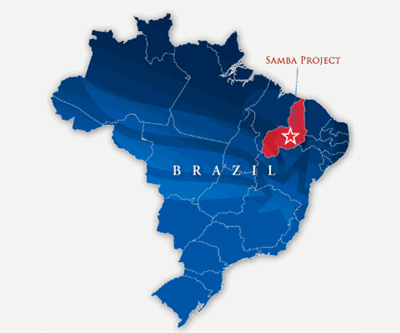Company growth feeds human growth: junior secures key phosphate deposit in Brazil

Brazil, now the envy of debt-ridden nations, is scrambling to strengthen its control over domestic food production. This move became a matter of national security as the country saw 2008’s increased fertilizer prices threaten its agricultural sector. The result has been a flurry of activity from the domestic mining community and major tax incentives provided by the Brazilian government for two reasons: agriculture accounts for 1/3 of Brazil’s economy and yet the country still imports 50% of its phosphate and 90% of its potash. Brazil is also the second largest importer of phosphate globally as a result of it being the world’s leading agrarian country.
Of the Canadian miners vying for a slice of the Brazilian landscape, we have closely followed Eagle Star Minerals Corp. [EGE – TSX.V], whose recent acquisition of a new phosphate project in the Parnaiba Basin has further strengthened the Company’s portfolio. EGE’s previous work on its Ruth Project led to the discovery of the nearby Samba Project, which is now the Company’s flagship operation.
The 100% owned Samba Project has all the right characteristics of a company maker. Lying close to the Ruth project, the Samba consists of 60 mineral claims covering 109,285 hectares within the western portion of the Piauí state, strategically located near Valença and São José do Peixe. This area includes the Balsas and Bom Jesus Agricultural Centres and is host to a large soy industry with production of over 2.3 million tonnes annually. As well, the project is only 100km from the Transnordestina railroad, which, when completed in 2013, will connect the region to the three major ports in North Eastern Brazil. This location will enable EGE to not only supply phosphate to the local market but to other possible markets as well.
On top of its strategic location near existing soy plantations and key infrastructure, the exploration results from the Samba are highly promising. Reconnaissance work in the Parnaiba Basin uncovered an area of 200km by 170km covered by the Longá Formation (below). Within the formation, three sub areas have been identified, consisting of interbedded siltstones over 100 metres thick.
According to EGE, the phosphate mineralization at the Samba is very similar to other well-known phosphate mines and deposits. EGE performed sampling on existing road cuts, generating 201 channel samples (below). Lab results have returned exceptional values, with 12% of regional samples returning values of over the 2.5% P2O5 cutoff grade.
The Company has now planned a follow-up exploration program on Samba and on its other previously announced project (Ruth) to further understand their potential. This program will include detailed geological mapping, a topographic survey, additional channel and trench sampling, and possibly a diamond drill program in the second quarter of 2012. The following Samba results present strong evidence that further exploration will likely occur, uncovering what could be a very large deposit:
Management has also undergone a positive restructuring. Mr. Fabio Carvalho de Mendonca is now the Company’s Exploration Manager, while Mr. Patrick Brandreth has been appointed to the position of Manager, Corporate Development. Mr. Carvelo de Mandeonca brings 10 years of experiences as a senior geologist with Xstrata Nickel, Yamana Gold and Castillian Resources; Mr. Brandreth brings a strong background in corporate communications, having developed services for multiple TSX.V-listed companies throughout his career. As well, the appointment of Mr. Leslie Shen as CFO brings strong financial management to the team. These additions compliment an already strong team, which includes the former Brazilian Minister of Economy, Finance and Planning and a former Senior Geologist from Vale. For EGE, the aforementioned changes mean that the Company now has the ability to develop the in-house capabilities needed to identify and develop agro-mineral properties in Brazil.
“Brazil is a beautiful country that has plenty of sunshine, land and water, but still needs stimulation to grow its food,” says Friedlander. “At this time, we are quite enthusiastic about the prospect of adding near-term shareholder value and enhancing the opportunity for the North American market to take part in the further growth of Brazil’s agro-industry. It’s quite clear to us the opportunity that presents itself here in Brazil and we have full intentions of taking advantage of that. We feel the infrastructure and know-how we have built around these basic fundamentals over the past year, without a doubt, will reward our shareholders for their support.”
Now that Eagle Star has switched its focus to phosphate, the Company is in a position that will likely prove beneficial to shareholders. The focus on Samba and Ruth, located within a key agro-minerals region, allow EGE to aggressively pursue exploration and eventually production, keeping shareholder dilution to a minimum.
And with the former Brazilian Finance Minister and a strong team of top geology and business professionals, Eagle Star’s management can execute the Company’s Brazilian actions in-house. This local expertise is essential in understanding Brazil’s vast agricultural sector. The recently acquired Samba Project is set to make EGE a part of this growth, due to its excellent exploration results, close proximity to a major soy-growing region and the Transnordestina railway, and the potential for near-term production. Phosphate’s key role in growing food suggests a bright future for companies that focus on this agro-mineral, as miners like Eagle Star build a business model that will feed the masses.
{{ commodity.name }}
{{ post.title }}
{{ post.date }}






Comments